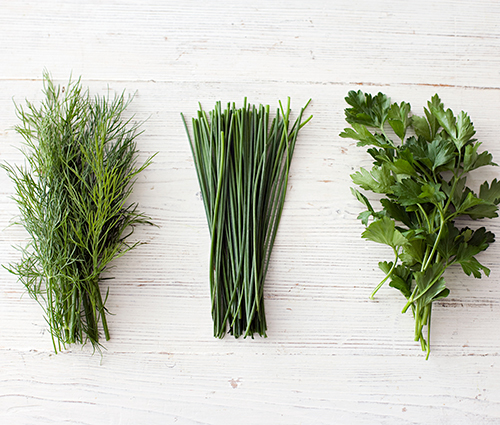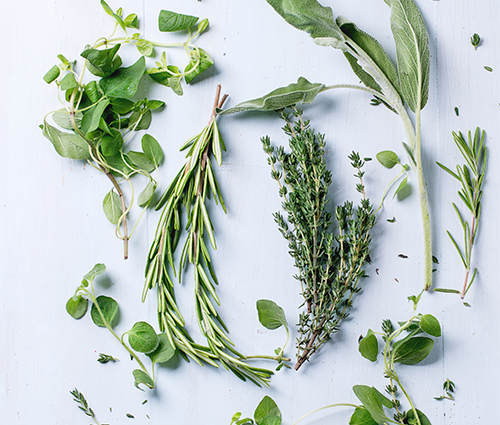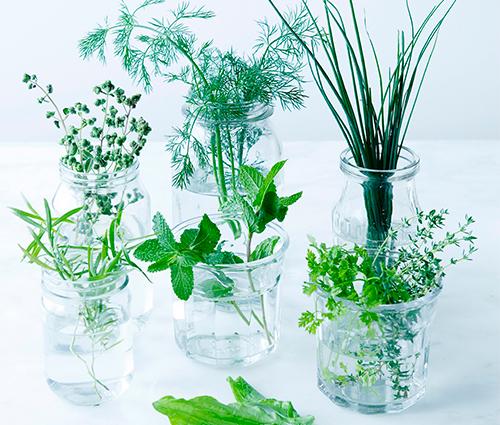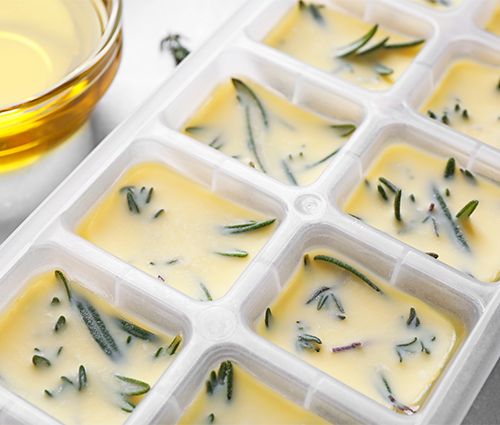Many cooks will tell you that using fresh herbs can take a meal from good to great. But how do you preserve fresh herbs so they last longer than only a few days? In this article, we’ll walk you through the differences between tender (soft) and woody (hard) herbs, including how best to clean and store them.
Table of Contents

Storing Tender and Woody Herbs

Being able to tell the difference between tender and woody herbs will help you determine the best storage method.
The main difference is in the stem. Tender herbs, such as parsley and basil, have soft leaves on grasslike stems. Woody herbs, such as thyme or rosemary, have firmer leaves on stiff, wood-like stems that are not usually eaten.
Tender Herbs

Often containing a more delicate flavour than the woody variety, tender herbs can be added fresh to a dish or sprinkled in near the end of cooking to preserve their subtle flavours. Tender herbs are ideal for making fresh, bright sauces like pesto or chimichurri by adding them to a few readily available pantry items and blitzing them in a food processor.
- Parsley – curly or flat (“flat parsley” is also referred to as “Italian parsley”)
- Cilantro
- Basil
- Mint
- Chives
- Dill
Woody Herbs

Typically stronger in flavour than tender herbs, woody herbs are often cooked into dishes and sauces to add big flavour. Because of their bold taste and fragrant qualities, woody herbs are ideal for roasting, braising, or infusing cooking oils.
- Oregano
- Rosemary
- Sage
- Thyme
- Marjoram
Washing and Drying Herbs

Whether you get your herbs from the grocery store, a farmer’s market, or your backyard garden, it’s always important to remove dirt and harmful bacteria before using them.
Once cleaned, tender herbs should be handled carefully and placed in a container with some water, the way you treat fresh flowers. Woody herbs, on the other hand, can be rolled inside a damp paper towel and sealed in a plastic bag.
When washing fresh herbs, always use cool water. With tender herbs, you can wash under the kitchen faucet on low pressure, but because they tend to be more delicate, consider immersing them in a bowl filled with cool water and letting the dirt settle to the bottom. Once the dirt has settled, remove the herbs and carefully rinse them again in a second bowl of fresh water. Woody herbs are more robust and can stand a little more handling; feel free to wash them in the sink under stronger pressure or toss them in a salad spinner.
Once the herbs have been carefully washed, it’s important to dry them thoroughly. Give the herbs a few shakes, then place them on a dry paper towel or fresh kitchen towel. Gently cover the herbs with another layer of towel to dry the top sides and soak up any moisture.
Storing Tender Herbs in the Fridge


Many people don’t realize how long fresh herbs can last in the fridge if stored properly! Simply cut off the ends like you would fresh flowers, then store the herbs in a mason jar or plastic container with roughly an inch of water. Store the herbs on the lower shelf of your fridge. Cover the herbs with a plastic bag or container lid to keep the oxygen out, and refresh the water if it starts looking cloudy. Stored like this, tender herbs should last for up to three weeks.
Six Easy Steps For Storing Tender Herbs In The Fridge
Tip – Storing Fresh Basil: Basil needs to be treated a bit differently than other tender herbs because its leaves will turn black if it gets too cold. To get the best out of your fresh basil, follow the above steps for storing tender herbs, but avoid step 5. Instead of storing basil in the refrigerator, keep the herb at room temperature out of direct sunlight — it thrives in warmer conditions!
Storing Woody Herbs in the Fridge

Once your woody herbs are cleaned and dried, place them in a damp paper towel or cheesecloth, roll them up, and place them in a plastic bag or reusable container. This will help to keep out decay-producing oxygen. Stored like this, woody herbs can last 2-3 weeks in your crisper drawer.
Six Easy Steps For Storing Woody Herbs In The Fridge
- Gently wash and dry the herbs
- Cut the ends and discard any dead or discoloured leaves
- Cover the herbs in damp paper towel or cheesecloth
- Place the covered herbs in a sealed plastic container or plastic bag
- Store the herbs in your refrigerator’s crisper drawer
- Dampen the paper towel when it begins to dry out
How to Freeze Basil and Other Herbs

Whether you’ve got a bumper crop of basil or your neighbour gave you more mint than you know what to do with, it’s important to store herbs properly if you want to extend their lifespan. Freezing herbs is an easy and effective way to keep herbs good for up to a year and have them handy whenever you need them.
One way to make frozen herbs convenient to use is by freezing them in ice cube trays. To do this, just chop a few tablespoons of herbs and freeze them in water or olive oil. Using oil means you have a perfect addition for any soup or sauce; and if you freeze them in water, simply let the ice thaw and soak up the extra liquid with a paper towel. A small plastic bag can work as a substitute for an ice tray.
Woody herbs also freeze well; simply wrap the washed herbs in a paper towel, seal in a plastic bag, and put in the freezer.
Six Easy Steps For Storing Woody Herbs In The Fridge

- Gently wash and dry the herbs
- Cut the ends and discard any dead or discoloured leaves
- Chop the herbs into small portions (one or two tablespoons in size)
- Place the herbs in a plastic freezer bag or an ice cube tray
- Fill the remainder of the freezer bag or ice cube tray with water or olive oil
- Place in the freezer; the herbs will remain usable for up to one year
How Long do Fresh Herbs Last?

When stored properly, fresh herbs can last from 1 to 3 weeks in the fridge, and up to one year when frozen.
There’s no better way to get creative in the kitchen than by exploring the many delicious uses of fresh herbs! Learn more about the differences between tender and woody herbs, including how to store them and how long they will last. Here’s a look at some of the most commonly used fresh herbs and their average lifespans when stored properly in the refrigerator.
| Soft (or Tender) Herbs | Hard (or Woody) Herbs |
|---|---|
| Parsley – 3 weeks | Rosemary – 3 weeks |
| Cilantro – 3 weeks | Thyme – 2 weeks |
| Mint – 2 weeks | Sage – 2 weeks |
| Basil – 1 week | Oregano – 2 weeks |
| Chives – 1 week | Marjoram – 2 weeks |
Pesto: A Fresh Spin on an Old Favourite






